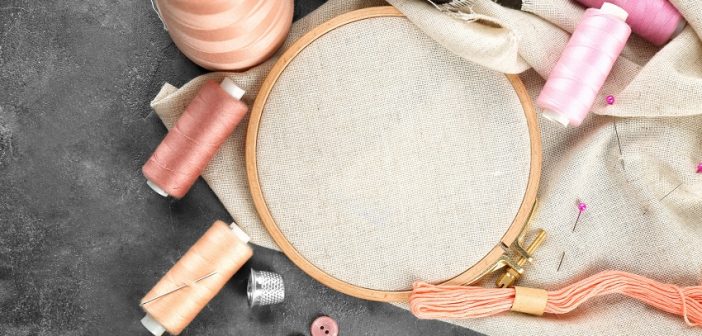Embroidery and printing are like the two sides of the same coin. Both of them have their pros and cons. How is embroidery different from printing? Let’s have a look at this.
In embroidery, the logo or the machine embroidery designs in the hoop is ‘stitched’ into the fabric, which makes it long-lasting. Whereas, in the case of printing, the logo or design is ‘printed’ upon the fabric, which makes it less long-lasting than the embroidery. This is a basic difference between the two. Now, here is why you should choose either of them.
Embroidery
If you are choosing embroidery on your products to provide a customized felling to the clothing and textiles, here is why you should stick to it.
- Durability
Undoubtedly, embroidery stays for longer on the fabric without getting faded or cracking and peeling apart, unlike in the case of printing. The embroidery stays intact on the fabric, even after multiple washes. The reason being, in embroidery, the design is made with the help of sewing the thread in the fabric, which nearly makes it permanent and durable.
- Better finish
If you are looking for adding logos to a T-shirt or fabric, embroidery, without a doubt, provides a better finish to the overall look. Embroidering also adds a textured 3D effect, which makes the logo or design look more realistic. Logos mostly form part of formal wear, and formal dresses always shout discipline, cleanliness, and element of class. The embroidered logo fits the bill perfectly because of its finer finish and perfect texture.
The embroidered logo overall is considered more professional than printing.
- Suitable for a thicker fabric
Fabrics that are normally used for logos and adding design are suitable for embroidery purposes. Be it school uniforms, formal dresses, caps, sweaters, hoodies, embroidery works better on nearly all fabrics and attires used in daily wear.
When Not To Choose Embroidery?
- Thicker fabrics
Embroidery doesn’t work well on fabrics with heavy gradient. When the designs are large, embroidery not only becomes expensive but much less effective and difficult to achieve.
- Too thinner fabrics
Embroidery also doesn’t work out for very thin fabrics as thin fabrics are not able to hold the weight of threads leading to puckering due to thread tension. The overall finish will be hampered, and such work will not last long.
- Budget constraints
Embroidery is long-lasting and is therefore expensive. If you have budget constraints, embroidery may not be suitable for your pocket. However, the money spend is worth it because of its durability and one-time investment advantage.
Printing
Where embroidery is used mostly for logos on formal and professional wear, printing is made to use on informal attires basically for advertising and promotional purposes. Here are some of the reasons why you should prefer printing over embroidery.
- Requires no conversion
Often for more complicated designs, embroidery requires digitizing the embroidery designs with the help of software. The design in an image form is made to load with the help software into an embroidery machine to convert it into an embroidery design.
No such conversion is needed in printing designs. The image file design is directly made to print over the desired fabric, and it is done. This also makes printing less time-consuming. Moreover, depending on the quality of the print, they can be made to last longer.
- Budget-friendly
Depending on the purpose of printing, cheap as well as quality printing is done. There are two types of printing, namely screen printing and Direct to Garment Printing (DTG). Logically, DTG is cheaper than screen printing, as well as embroidery.
Screen printing is much better than DTG, costly, and more durable. Screen printing requires a big setup, which involves a lot of space for assembling the specialist machinery. This makes it effective for bulk production.
- Enables more complicated artwork
Printing allows us to work in different horizons, better with complicated, large designs and greater gradients. It works best for T-shirts and sweatshirts, which require large designs to be printed.
- Vibrant patterns
Unlike with embroidery, printing not only allows you to print large designs economically but also enables you to print and use vibrant and bright colors.
When Not To Choose Printing?
- Thick materials
Printing is not for thick and uneven patterns like jackets, fleece, and caps. Printing on such thick fabrics may require more resources, which will ultimately end up adding to the costs.
- Two dimensional
Printing only enables two-dimensional designs. If you are looking for products with 3D textures, printing may not be able to provide that level of finish and texture.
So, embroidery is better used for professional purposes, whereas printing is better used for advertising purposes that are used for a short period.





We provide the highest quality custom embroidery digitizing service. Our beatable and cheapest price starts at only $1 (for stitch per thousand packages only). Digi provides the best quality embroidery digitizing in a quick turnaround. Normally our turnaround is from 1 to 24 hours for normal files. And 24 to 48 hours for big and difficult files. Also, we can treat it as very urgent if our client asks. Feel free to contact us by sending a message from the contact page for quotes or queries.
Services That We Provide:
# Custom Embroidery Digitizing Service.
# Convert Image to Embroidery File
# Raster Image to Vector File
# Vector Logo
# Sequin Embroidery Digitizing
# Applique, 3D, Puff, Chenille, Cording, Taping, Magic sequin, etc embroidery digitizing service.
No need to pay if you are not satisfied with Digi Embroidery.
such a nice post thanks you for the sharing with us